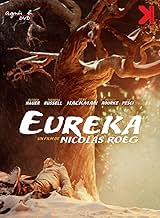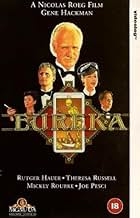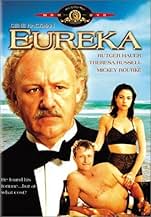AVALIAÇÃO DA IMDb
5,9/10
4,3 mil
SUA AVALIAÇÃO
Em 1925, o solitário e obcecado garimpeiro do Ártico, Jack McCann, finalmente encontra ouro. Vinte anos depois, ele começa a perder o controle quando sua única filha fica noiva de um homem d... Ler tudoEm 1925, o solitário e obcecado garimpeiro do Ártico, Jack McCann, finalmente encontra ouro. Vinte anos depois, ele começa a perder o controle quando sua única filha fica noiva de um homem de quem ele não gosta muito.Em 1925, o solitário e obcecado garimpeiro do Ártico, Jack McCann, finalmente encontra ouro. Vinte anos depois, ele começa a perder o controle quando sua única filha fica noiva de um homem de quem ele não gosta muito.
- Direção
- Roteiristas
- Artistas
- Prêmios
- 1 indicação no total
- Direção
- Roteiristas
- Elenco e equipe completos
- Produção, bilheteria e muito mais no IMDbPro
Avaliações em destaque
Rarely has a film had so much potential, that goes unrealized. Gene Hackman and his gold discovery is beautifully photographed, yet so unlikely and unrealistic, that it seems surreal. From the moment things shift to the island, the movie plays like a beautiful montage, with story continuity only an afterthought. It becomes merely a series of images strung together with philosophical messages, huge time jumps, flashbacks, and metaphysical nonsense. Yet, the images of ultra violence, nudity, snow, gold flakes, and the Victorian splendor, will linger long after the movie ends. From that standpoint at least some of "Eureka"s potential is realized, but not enough to grab the greatness that was within grasp. - MERK
Weird, sloppy, self-indulgent, meta-physical, sometimes boring, sometimes hallucinatory: all these things describe this misfire from director Nicolas Roeg. Gene Hackman stars as a gold prospector in Alaska during the final days of the gold rush. Most of the people have given up and gone home at this point, but Hackman refuses. After a strange encounter with a meteor (I think) he receives some kind of lucky rock (I think) that gives him the extra push to find his gold strike. And does he ever. Cut to decades later, and he's fabulously wealthy, with a giant estate named Eureka. His grown daughter (Theresa Russell) has married a European playboy (Rutger Hauer) that dad doesn't approve of. There's also a shady consortium of some sort, headed by Jewish tough guy Joe Pesci (!) and represented by Italian lawyer Mickey Rourke (!), that needs Hackman's financial backing for some new endeavor.
The cinematography is beautiful, as it usually is in Roeg's films, but the plot is a mess of ham-handed symbolism and uninspired dramatics. The terrific cast, which also includes Ed Lauter, Joe Spinell and Corin Redgrave, is good, with Hackman the stand-out, as usual. Rourke looks scared and uncomfortable, which fits with his character, but he comes across more like he's fully aware of how wrong he is in the role. Russell and Hauer are both beautiful, and they both spend much of the film in various states of undress. There's also one of the most brutal, protracted murder scenes I've seen in a film in a long time. It's starts off shocking, but becomes rather ludicrous the longer it's dragged out. I can't really recommend this film to anyone except Hackman fans or fans of bizarre obscurities.
The cinematography is beautiful, as it usually is in Roeg's films, but the plot is a mess of ham-handed symbolism and uninspired dramatics. The terrific cast, which also includes Ed Lauter, Joe Spinell and Corin Redgrave, is good, with Hackman the stand-out, as usual. Rourke looks scared and uncomfortable, which fits with his character, but he comes across more like he's fully aware of how wrong he is in the role. Russell and Hauer are both beautiful, and they both spend much of the film in various states of undress. There's also one of the most brutal, protracted murder scenes I've seen in a film in a long time. It's starts off shocking, but becomes rather ludicrous the longer it's dragged out. I can't really recommend this film to anyone except Hackman fans or fans of bizarre obscurities.
The components for a great movie (maybe even three great movies) are all there, but by trying to be all three things AND trying to slather it all in discreet symbolism the movie tends to almost get going and then loses focus. A stuffed story like this could be well told if one were to jettison most of the symbolism, but that doesn't happen. The symbolism could make for a powerful movie if the focus of the movie is tightened, but roeg chooses not to do that either.
Likewise a bit of screenwriting help could have been used as..... especially in the later court room scenes... the entire dialogue enters overwrought soap opera territory. A terrific cast is mostly squandered, buried under the morass symbolism which only seems like ideas not thought through to their conclusion. I.e. Here's a story about a man who got everything he wanted in life and the psychological impact it had on him and those around him..... but were going to throw in stuff about the mob and an orgy and end up with an extended court drama, and a war that adds nothing to that premise.
Surprisingly the violence done in the movie is pretty horrific coming from roeg, a director not really known for violence in his movies. The cinematography at times wonderful is hemmed in by the constraints of the plot.
Taking the centerpiece of this movie would over the perfect opportunity for a well deserved remake now.
Likewise a bit of screenwriting help could have been used as..... especially in the later court room scenes... the entire dialogue enters overwrought soap opera territory. A terrific cast is mostly squandered, buried under the morass symbolism which only seems like ideas not thought through to their conclusion. I.e. Here's a story about a man who got everything he wanted in life and the psychological impact it had on him and those around him..... but were going to throw in stuff about the mob and an orgy and end up with an extended court drama, and a war that adds nothing to that premise.
Surprisingly the violence done in the movie is pretty horrific coming from roeg, a director not really known for violence in his movies. The cinematography at times wonderful is hemmed in by the constraints of the plot.
Taking the centerpiece of this movie would over the perfect opportunity for a well deserved remake now.
Of the Nicolas Roeg films I've seen thus far "Eureka" is in many ways the most conventional. Probably this is due to its being based on real-life events, to wit, the horrific murder in his palatial house of a powerful and super-wealthy man just as the Second World War is nearing its close.
Before we get to that, there's an eerie, atmospheric prologue set in the Yukon twenty years earlier where Gene Hackman's Jack McCann character achieved his one goal in life, to strike gold and become rich beyond his wildest dreams. Fast forward those twenty years and he's married to his now dissolute wife, Jane Lapotaire with an impulsive adult daughter, played by Theresa Russell, waited on hand and foot, living the life of luxury on his own private island in the Bahamas named Eureka after the word he uttered when making his lucky strike.
But of course, great wealth doesn't guarantee great happiness and so Jack's peace of mind is beset on two fronts. Firstly his impressionable daughter has fallen in with a handsome, libertine go-getter, Rutger Hauer's titled Frenchman Claude van Horn. Jack thinks Claude is literally a gold-digger and is provoked to extreme rage and violence against him when he learns the couple have secretly married. His other concern is that he's being pressurised by his up till now trusted business partner who's now in tow to a shady mobster who wants to open up Eureka to gambling, like a second Cuba.
How this self-made man confronts head-on both of these problems and the disastrous consequencies which follow, determines the outcome of the movie, culminating in his horrific killing and the subsequent trial of van Horn, the verdict coincidentally falling due on the day the war actually ends.
Like I said, this Roeg film is perhaps easier to follow than others in his catalogue, but naturally he throws in a few curve-balls along the way and elsewhere demonstrates his undoubted directorial bravura. The depictions of sex and violence are graphic, especially the drunken orgy scene masterminded by van Horn and the nightmarish slaying of McCann in his own bed but these are contrasted with the opulent depiction of the trappings of wealth and the matter-of-fact gravity of the extended courtroom trial.
I personally felt that rather like McCann himself, the film peaks at the moment he hits the motherlode, in a remarkably staged scene with McCann literally awash in his new wealth. There are strong performances by Hackman, and Hauer, in particular with Joe Pesci warming up on the sidelines for his future gangster roles under the direction of Scorcese.
Yes, the film is uneven with occasionally overripe dialogue and some confusing plot-shifts but it certainly works as a study of greed, power and the corruption of wealth.
Perhaps the moral here is that it's better just to let the rainbow fade rather than chase the pot of gold you imagine is at the end of it.
Before we get to that, there's an eerie, atmospheric prologue set in the Yukon twenty years earlier where Gene Hackman's Jack McCann character achieved his one goal in life, to strike gold and become rich beyond his wildest dreams. Fast forward those twenty years and he's married to his now dissolute wife, Jane Lapotaire with an impulsive adult daughter, played by Theresa Russell, waited on hand and foot, living the life of luxury on his own private island in the Bahamas named Eureka after the word he uttered when making his lucky strike.
But of course, great wealth doesn't guarantee great happiness and so Jack's peace of mind is beset on two fronts. Firstly his impressionable daughter has fallen in with a handsome, libertine go-getter, Rutger Hauer's titled Frenchman Claude van Horn. Jack thinks Claude is literally a gold-digger and is provoked to extreme rage and violence against him when he learns the couple have secretly married. His other concern is that he's being pressurised by his up till now trusted business partner who's now in tow to a shady mobster who wants to open up Eureka to gambling, like a second Cuba.
How this self-made man confronts head-on both of these problems and the disastrous consequencies which follow, determines the outcome of the movie, culminating in his horrific killing and the subsequent trial of van Horn, the verdict coincidentally falling due on the day the war actually ends.
Like I said, this Roeg film is perhaps easier to follow than others in his catalogue, but naturally he throws in a few curve-balls along the way and elsewhere demonstrates his undoubted directorial bravura. The depictions of sex and violence are graphic, especially the drunken orgy scene masterminded by van Horn and the nightmarish slaying of McCann in his own bed but these are contrasted with the opulent depiction of the trappings of wealth and the matter-of-fact gravity of the extended courtroom trial.
I personally felt that rather like McCann himself, the film peaks at the moment he hits the motherlode, in a remarkably staged scene with McCann literally awash in his new wealth. There are strong performances by Hackman, and Hauer, in particular with Joe Pesci warming up on the sidelines for his future gangster roles under the direction of Scorcese.
Yes, the film is uneven with occasionally overripe dialogue and some confusing plot-shifts but it certainly works as a study of greed, power and the corruption of wealth.
Perhaps the moral here is that it's better just to let the rainbow fade rather than chase the pot of gold you imagine is at the end of it.
Eureka is the kind of film you think you'll hate unless you give it a fair shake. It is a interplay between many characters, much like a soap opera. It works only if you take a general interest in the trivialities of each character. Jack McCann (Hackman) is the center of the film. His life is all about the gold he felt he earned, and the principle that he will never have any partners to share a percentage with. His life is ravaged by Mayakofsky (Pesci) and his henchmen. Charles Perkins, a friend of Jack's spent much of the movie trying to warn him that these men were dangerous. Jack's dilemma wasn't that he was waiting for his death, but the fact that he thought he was invincible. Being stubborn and set in his ways, Jack refused to give in to Mayakofsky. Jack was a man preoccupied with gold, but not loveless. He seemed to love all the women in his life. Also his daughter, Spacey Tracy. A loose young woman married to Claude (Hauer). Tracy had her head in the clouds, and wanted to live in a fantasy world. She did not provoke the fights between her father and Claude, but instigated them. She wanted Claude to fight as a proof of his love. Claude was most elusive. You never get his angle. If he loved Tracy or was just using her. She even used the witness stand as a way of finding out where Claude stood with her instead of pinning for the guilty ones involved in the tragic end of her father. (Claude did his own defense in court!) The movie has it's funny points. Like the dinner table scene at the McCann's where Jack makes some insulting remarks to the guests. Some of the best scenes involve Aurelio D'Amato, played by Mickey Rourke. He's cast in another glossed over film where he is perfect, but forgotten. D'Amato is a yiddish associate of Mayakofsky. And one of the main guys pestering Jack to sign the Luna Bay deal.(Mayakofsky wanted to build a casino on it.) There are scenes where D'Amato is begging Jack to sign. His baby face and soft voice should have gotten the devil to sign the document, but Jack wasn't so easy. Rourke's performance alone is reason enough to see this movie. And its not surprising he has a night with Tracy. Tracy loved Claude, but how could she resist D'Amato? Eureka is more of a film about the desires of man. Each character wants something, and they spend the entire film in pursuit of those things.
Você sabia?
- CuriosidadesDirector Nicolas Roeg has said of this movie: "I was initially interested in a character who wanted to satisfy an all-consuming desire...'that's what I want'...but when he gets it what happens after his brief ecstatic moment? Nothing more than left over life to kill."
- Erros de gravaçãoWhen Jack is run off his motorbike by Charles and Jack gets into Charles's car, a person in a yellow raincoat is reflected in the window of the car.
- Citações
Jack McCann: Once I had it all. Now I just have everything.
- Versões alternativasAlthough the UK cinema version was intact the 1986 Warner video release was missing 7 seconds from the death of Jack McCann, notably shots of a flame thrower being run over his body and face. These were not cut by the BBFC so presumably they were distributor edits. DVD releases are fully uncut.
- ConexõesFeatured in Loose Talk: Episode #1.7 (1983)
Principais escolhas
Faça login para avaliar e ver a lista de recomendações personalizadas
- How long is Eureka?Fornecido pela Alexa
Detalhes
- Data de lançamento
- Países de origem
- Central de atendimento oficial
- Idioma
- Também conhecido como
- River of Darkness
- Locações de filme
- Empresas de produção
- Consulte mais créditos da empresa na IMDbPro
Bilheteria
- Faturamento bruto nos EUA e Canadá
- US$ 123.572
- Faturamento bruto mundial
- US$ 123.572
Contribua para esta página
Sugerir uma alteração ou adicionar conteúdo ausente



































